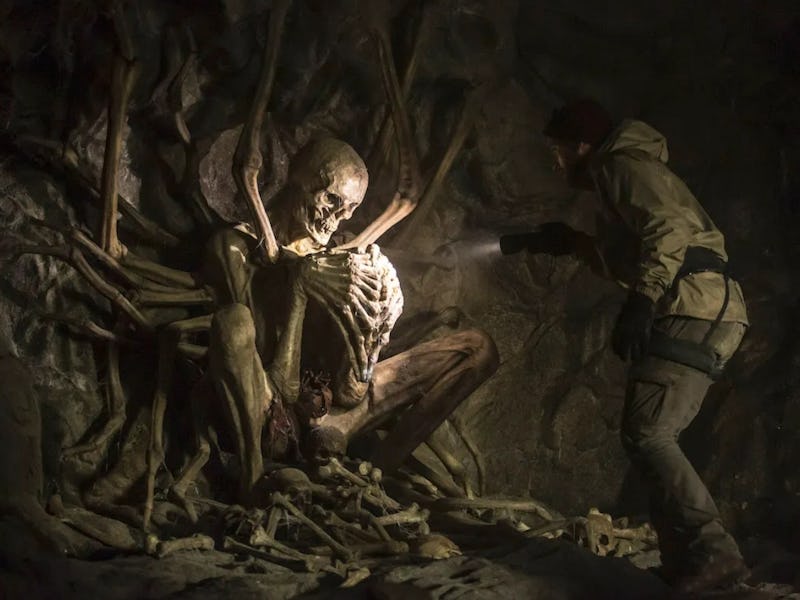Abandoned On Release, The Empty Man Became The 2020s’ First Cult Classic
Theaters, unfortunately, were empty too.

With most movie theaters shut down by the unprecedented events of 2020, studios took different strategies to handle their paralyzed releases. Some titles were released on VOD, others were sold to streaming services, and many high-profile films were pushed back until they could enjoy a robust rollout. But audience hesitation to return to theaters also gave studios an opportunity to bury unwanted films they’d inherited. Although it had been greenlit before Disney purchased Fox, David Prior’s supernatural horror mystery The Empty Man was dumped into theaters without fanfare in the fall.
The fact that The Empty Man was the last title ever distributed by 20th Century Fox didn’t drum up any hype, as the film earned middling reviews and bombed at the box office. Although poor test screenings had prompted serious inquiries into the post-production process, the lack of marketing suggested that Disney had left Prior’s film out to dry.
Perhaps even loyal horror audiences were dismayed by the 137 minute running time, Prior’s lack of credits, or the unusual tagline and poster, which evoked the “urban legend” subgenre of Slender Man and The Bye Bye Man. However, it became clear why distributors had been so hesitant about unveiling the film once it began to draw interest from niche genre fans; The Empty Man was a disturbing, paranoid, and decidedly noncommercial study of generational evil that was far more surrealist than its cryptic plot description suggested.
The Empty Man begins with one of the most terrifying opening scenes since the original Scream, as viewers are introduced to a group of hikers preyed upon by an evil spirit during an expedition through Bhutan. Encountering an ancient demon in an exotic location is frightening enough, but the characters aren’t any safer after they escape the mountain; by taking multiple forms, a mysterious Empty Man tracks down and possesses all that witnessed its resting place. Although these brutal 22 minutes are a tremendous work of horror filmmaking in their own right, they set the stage for a more meditative story that reveals the lasting ramifications of unleashing this existential force of evil.
Prior’s flexibility may have made The Empty Man difficult to promote, as this ruthless carnage is followed by a somber introduction to former detective James Lasombra (James Badge Dale), who’s been grieving the loss of his wife and son. Although framing a protagonist as someone who’s already lost everything could have made The Empty Man feel emotionally vapid, Lasombra’s desensitization evaporates when he discovers clues linking a series of ritual killings in a small Missouri town.
Lasombra may resemble the type of grizzled, no-nonsense investigator seen on prestige shows like True Detective, but he also occupies the role of the supernatural skeptic. While Lasombra is willing to accept that his family’s loss was a horrific accident, he finds the demises credited to the enigmatic Empty Man too unusual to be disconnected.
The Empty Man effectively pivots between brutality and intrigue.
The Empty Man’s peculiar narrative construction made it an instant object of cult affinity; instead of following a straight line through Lasombra’s investigation, the film exposes a labyrinth of tragedies linked to the various incidents involving the supernatural entity and its victims. Between suspected suicides, despondant survivors, and a cult of fervant zealots, the Empty Man has weaved itself into society’s vulnerable underbelly. While this approach may have baffled an audience expecting to see a traditional horror film like Annabelle, The Empty Man became an obsession for analytical cinephiles who tracked the subtle bits of foreshadowing.
Prior had previously served as a behind-the-scenes documentarian cataloging the production of various David Fincher films, and Lasombra's meticulous sleuthing is reminiscent of the crime scene intrigue of Se7en or the unrelenting dread of Zodiac. Although The Empty Man applies a procedural perspective to the supernatural genre, the conclusions it finds are less defined; not every facet of the Empty Man is explained in full, leaving its audience to contemplate the degree to which sinister forces had been manipulating the narrative. “Lynchian” is often overused when describing creepy thrillers, but The Empty Man is the rare modern film that captures the nightmarish confusion of Lost Highway or Mulholland Drive.
The Empty Man may have been too transgressive to ever be a mainstream hit, but a film this bleak definitely wasn’t what audiences were looking for amid a global health crisis that limited social interactions. The 2020 films that earned significant recognition were inspirational underdog journeys (The Sound of Metal), crowd-pleasing charmers (Palm Springs), rousing historical dramas (The Trial of the Chicago 7), and intimate stories of familial connectivity (Minari); even Tenet, which premiered before many theaters reopened, promised the type of spectacle that audiences sought after being confined to their homes.
Comparatively, The Empty Man seemed to warn that there was no safety from the grasp of an age-old villain that preyed upon human frailty. In a time where people were desperate to feel anything, The Empty Man suggested that attempting to defy fate is futile. The decade is too young to anticipate which films will be deemed underrated in the future, but The Empty Man has already found a terrifying life beyond its disappointing debut.